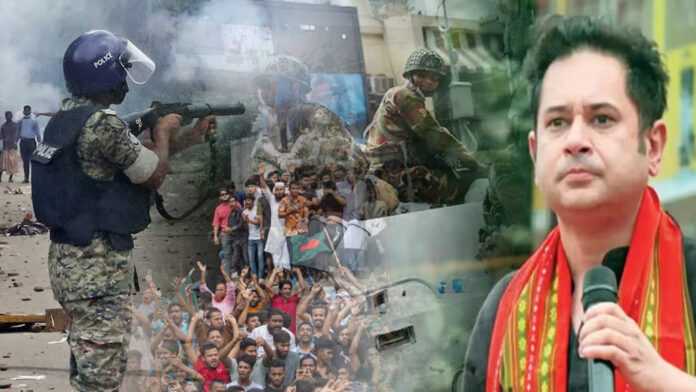The political unrest in Bangladesh, which escalated following the resignation of Prime Minister Sheikh Hasina, has raised serious concerns in Tripura. Pradyot Manikya Debbarma, the chairman of the Tipra Motha Party, has called for an immediate closure of the India-Bangladesh border to prevent any potential spillover of violence and illegal migration into the northeastern state. Debbarma expressed deep concern over the situation in Bangladesh and its possible impact on Tripura, which shares a long and porous border with the neighboring country.
Debbarma highlighted the need for swift action, urging the central government to take proactive steps in securing the border. He warned that the ongoing crisis in Bangladesh could lead to a surge in illegal immigration, which might destabilize the region. According to him, the closure of the border is necessary to maintain peace and security in Tripura and other northeastern states.
The unrest in Bangladesh has already led to increased vigilance along the border, with security forces on high alert. The Border Security Force (BSF) has intensified patrolling in the area to prevent any unauthorized crossings. Despite these measures, Debbarma remains concerned about the possibility of infiltration by anti-social elements or militants taking advantage of the chaotic situation in Bangladesh.
The situation in Bangladesh has also caused anxiety among the residents of Tripura, particularly those living in border villages. Many fear that the unrest could lead to a repeat of past incidents where large numbers of refugees sought asylum in India. The state government has assured the public that all necessary steps are being taken to ensure their safety. However, the call for border closure by Debbarma has resonated with many, reflecting the widespread apprehension in the region.
Tripura has a long history of dealing with the consequences of political turmoil in Bangladesh. During the 1971 Bangladesh Liberation War, the state witnessed an influx of refugees, which had a lasting impact on its demography and economy. Debbarma emphasized that Tripura cannot afford another such crisis and urged the authorities to act decisively to prevent any repeat of the past.
In response to Debbarma’s demand, the state government has initiated discussions with the central government regarding the situation. Officials are evaluating the current security measures and considering additional steps to enhance border protection. The possibility of temporarily closing the border is under review, with officials weighing the potential benefits and challenges of such a move.
The unrest in Bangladesh has also sparked concerns about its impact on trade and economic activities between the two countries. Tripura relies heavily on cross-border trade with Bangladesh, and any disruption could have significant economic consequences for the state. Debbarma acknowledged this concern but argued that the safety and security of the people must take precedence over economic interests. He suggested that the border closure, if implemented, should be temporary and monitored closely to minimize economic disruption.
Debbarma’s demand for border closure has also sparked a debate among political leaders in Tripura. Some have supported his call, citing the need to protect the state from potential threats. Others have cautioned against hasty decisions, arguing that closing the border could strain relations with Bangladesh and complicate efforts to manage the situation diplomatically.
As the situation in Bangladesh continues to evolve, the Tripura government is closely monitoring developments. The state is in constant communication with the central government and security agencies to assess the situation and respond accordingly. While the demand for border closure remains under consideration, the priority is to ensure that Tripura remains secure and that any potential risks are addressed promptly.
Pradyot Manikya Debbarma’s call for the closure of the India-Bangladesh border amid the ongoing crisis has highlighted the concerns of Tripura’s people. The state government is working to balance the need for security with the economic implications of such a move. As the situation unfolds, the focus will remain on protecting the region from the potential fallout of the unrest in Bangladesh.




